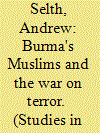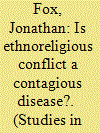| Srl | Item |
| 1 |
ID:
050903


|
|
|
|
|
| Publication |
Mar-Apr 2004.
|
| Summary/Abstract |
Burma's importance in world affairs has long derived from its critical geostrategic position, but another factor now attracting the interest of Western scholars and officials is Burma's large Muslim population. Usually overlooked in surveys of Islam in the Asia-Pacific region, Burma's Muslims are now being accorded greater attention. This is partly because of the harsh treatment they are receiving at the hands of the country's military government, known since 1997 as the State Peace and Development Council (SPDC). It is also due, however, to their growing international connections, which in one case at least includes links to pan-Islamic extremist groups. In this regard, the global war against terrorism has become both a burden and an opportunity for the Rangoon regime
|
|
|
|
|
|
|
|
|
|
|
|
|
|
|
|
| 2 |
ID:
050901


|
|
|
|
|
| Publication |
Mar-Apr 2004.
|
| Summary/Abstract |
The often changing range of terrorism journals selected for indexing in various databases adds to the elasticity of this field's definition. The electronic databases as well as websites change their format and content quite often and this instability hampers the formation of a clear delineation of the disciplinary boundaries of terrorism. Nevertheless, the integration of electronic databases into terrorism research has exposed researchers to a large number of journals that deal with various aspects of terrorism, and the boundaries of this subject are continually expanding to encompass new sub-areas. In addition to the known core journals covering terrorism, many peripheral journals are emerging that are concerned with the dynamics of this field. The exposure of researchers to such a massive amount of information, print and electronic, demonstrates a marked knowledge growth in this area of study. However, the field could become so broad, even before reaching disciplinary maturation, that it could defy any attempt at delineation.
|
|
|
|
|
|
|
|
|
|
|
|
|
|
|
|
| 3 |
ID:
050902


|
|
|
|
|
| Publication |
Mar-Apr 2004.
|
| Summary/Abstract |
The spread of conflict across borders (contagion) is a modern phenomenon of increasing importance. This study focuses on the extent to which cross-border religious ties facilitate contagion of ethnic conflict using data from the Minorities at Risk dataset. The findings show that religious contagion influences the extent of both ethnic protest and rebellion whereas nonreligious contagion influences only ethnic protest. They also show that only violent conflict, as opposed to peaceful mass-political movements, in one state influences conflict in a bordering state. One possible explanation for this is the argument that violence is an intrinsic element of religion. This can explain why religious contagion is stronger than nonreligious contagion and why religious conflicts cross borders only when they are violent ones. This argument is also consistent with previous findings on domestic conflict that show that although religious grievances expressed by an ethnic minority were a contributing factor to the level of rebellion in which that minority engages, they had a negative influence on the extent of peaceful protest.
|
|
|
|
|
|
|
|
|
|
|
|
|
|
|
|
| 4 |
ID:
050904


|
|
|
|
|
| Publication |
Mar-Apr 2004.
|
| Summary/Abstract |
This article aims to answer the following research question: What were the factors behind the Kremlin's decision to invade the Chechen Republic in 1994 and 1999? To answer this question, the author focuses on three independent variables: the strategic variable related to Russian national security; the economic variable centered on the Caspian Oil pipeline passing through Chechen territories; and Russian domestic politics. The author argues that a combination of these three factors, despite their varying importance, led to the outbreak of the Russo-Chechen wars in the 1990s
|
|
|
|
|
|
|
|
|
|
|
|
|
|
|
|